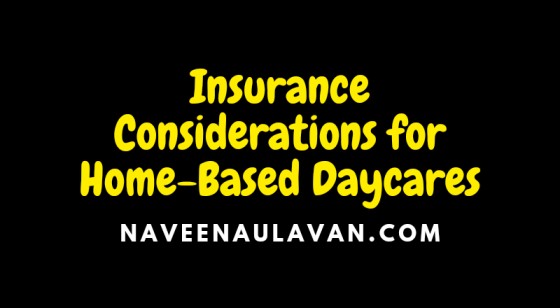Running a home-based daycare can be a rewarding venture for caregivers who want to provide a nurturing environment for young children while working from the comfort of their own homes. However, it is essential to understand the potential risks associated with operating a daycare in a residential setting and the importance of having appropriate insurance coverage. In this article, we will explore the insurance considerations that home-based daycare providers should be aware of to protect themselves, the children in their care, and their business.
The Need for Insurance
Running a daycare involves significant responsibilities, including ensuring the safety and well-being of the children. No matter how careful a caregiver may be, accidents can happen. In a daycare setting, injuries, property damage, or other incidents could occur, leading to potential liability for the provider. Insurance is a crucial risk management tool that can protect home-based daycare businesses from financial losses resulting from unforeseen events.
Types of Insurance Coverage
1. General Liability Insurance
General liability insurance is the foundation of any insurance coverage for home-based daycares. This type of insurance provides coverage for third-party bodily injury and property damage claims. For instance, if a child sustains an injury while under the daycare provider’s care, or if a parent’s property is damaged on the premises, general liability insurance can help cover the associated medical expenses, legal fees, and settlements.
2. Professional Liability Insurance
Professional liability insurance, also known as errors and omissions insurance, is designed to protect daycare providers from claims related to professional negligence or failure to meet the expected standard of care. This coverage can be particularly important in daycare settings, as caregivers are responsible for the well-being and safety of young children.
3. Property Insurance
While homeowners’ insurance policies typically cover personal property, they may not adequately protect daycare equipment, toys, and supplies used for the business. Home-based daycare providers should consider adding a property insurance rider or a separate business property insurance policy to cover these items in case of theft, damage, or loss.
4. Business Interruption Insurance
Business interruption insurance is essential for home-based daycares as it can provide coverage for lost income and ongoing expenses in case the daycare operations are suspended due to a covered event, such as a fire or natural disaster. This coverage ensures that the daycare provider can continue to meet financial obligations even when unable to operate temporarily.
5. Workers’ Compensation Insurance
In many jurisdictions, workers’ compensation insurance is mandatory for businesses with employees, including home-based daycares that hire staff. This insurance provides medical benefits and wage replacement for employees who sustain work-related injuries or illnesses.
6. Auto Insurance
If the daycare provider uses a vehicle to transport children, it is crucial to have commercial auto insurance. Personal auto insurance policies may not cover accidents that occur while using the vehicle for business purposes, so adequate coverage is necessary to protect against potential liabilities in such situations.
Risk Mitigation and Safety Measures
While insurance provides financial protection, daycare providers should also focus on risk mitigation and safety measures to prevent accidents and incidents from occurring in the first place. Some essential safety practices for home-based daycares include:
1. Childproofing the Premises
Ensure that the daycare environment is childproofed and free of hazards. This includes securing cabinets, covering electrical outlets, and removing or securing any potential choking hazards.
2. Maintaining Proper Staff-to-Child Ratios
Adhere to appropriate staff-to-child ratios to ensure that each child receives adequate supervision and attention.
3. Training Staff and Caregivers
Provide thorough training to all staff and caregivers on safety protocols, emergency procedures, and first aid. Regular training updates can help keep everyone prepared and informed.
4. Implementing Health and Hygiene Policies
Enforce strict health and hygiene policies, including regular handwashing, cleaning and sanitizing of toys and surfaces, and exclusion policies for sick children and staff.
5. Conducting Background Checks
Perform background checks on all staff members and volunteers to ensure a safe environment for the children.
6. Secure Insurance Coverage Early
Do not wait until an incident occurs to secure appropriate insurance coverage. It is best to have insurance in place from the beginning of the daycare operation.
Conclusion
Running a home-based daycare comes with immense responsibilities, and insurance plays a vital role in protecting the provider, the children, and the business from potential risks and liabilities. By securing the right insurance coverage and implementing robust safety measures, daycare providers can focus on what matters most – providing a safe and nurturing environment for the children in their care. Remember always to consult with a qualified insurance professional to assess your specific needs and find the most suitable coverage options for your home-based daycare business.
